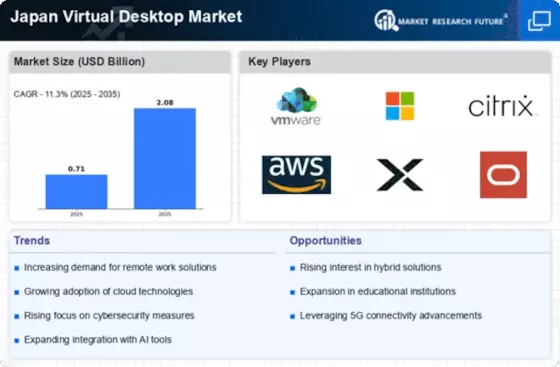Rising Cybersecurity Concerns
In the context of the Japan Virtual Desktop Market, rising cybersecurity concerns are a significant driver. With the increasing frequency of cyberattacks, organizations are prioritizing the protection of sensitive data. Virtual desktops offer enhanced security features, such as centralized management and data encryption, which are crucial for safeguarding information. Recent statistics indicate that cybercrime costs Japanese businesses over 1 trillion yen annually, highlighting the urgent need for secure IT solutions. As companies seek to mitigate risks, the adoption of virtual desktop infrastructure is likely to rise, as it provides a secure environment for remote access. This focus on cybersecurity not only drives demand for virtual desktops but also encourages innovation in security technologies within the industry.
Supportive Government Policies
The Japan Virtual Desktop Market benefits from supportive government policies aimed at fostering technological innovation. The Japanese government has introduced various initiatives to promote IT adoption and digital infrastructure development. For instance, the 'Society 5.0' initiative encourages the integration of advanced technologies, including virtual desktops, into everyday business practices. This governmental support is crucial for driving investment in virtual desktop solutions, as it creates a favorable regulatory environment. Additionally, public sector organizations are increasingly adopting virtual desktop infrastructure to enhance service delivery and operational efficiency. As these policies continue to evolve, they are likely to stimulate further growth in the virtual desktop market, positioning Japan as a leader in digital transformation.
Advancements in Cloud Technology
The Japan Virtual Desktop Market is significantly influenced by advancements in cloud technology. The shift towards cloud-based solutions has enabled organizations to deploy virtual desktops more efficiently and cost-effectively. Recent reports suggest that the cloud computing market in Japan is projected to reach 3 trillion yen by 2025, indicating a strong growth trajectory. This growth is likely to facilitate the adoption of virtual desktop solutions, as businesses seek to leverage the scalability and flexibility offered by cloud infrastructure. Additionally, the integration of cloud services with virtual desktop solutions allows for seamless updates and maintenance, further enhancing user experience. As cloud technology continues to evolve, it is expected to play a pivotal role in shaping the future of the virtual desktop market in Japan.
Growing Demand for Remote Work Solutions
The Japan Virtual Desktop Market is experiencing a notable surge in demand for remote work solutions. As organizations increasingly adopt flexible work arrangements, virtual desktops provide employees with secure access to corporate resources from any location. According to recent data, approximately 60% of Japanese companies have implemented remote work policies, driving the need for reliable virtual desktop infrastructure. This trend is likely to continue as businesses recognize the benefits of enhanced productivity and employee satisfaction. Furthermore, the Japanese government has been promoting telework initiatives, which further supports the growth of the virtual desktop market. The combination of corporate demand and governmental support creates a robust environment for the expansion of virtual desktop solutions in Japan.
Increased Focus on Digital Transformation
Digital transformation initiatives are driving the Japan Virtual Desktop Market as organizations seek to modernize their IT infrastructure. The push for digitalization is evident, with over 70% of Japanese companies prioritizing technology investments to enhance operational efficiency. Virtual desktops are integral to this transformation, providing a platform for deploying modern applications and services. As businesses transition to digital workflows, the demand for virtual desktop solutions is likely to increase, enabling employees to access necessary tools and resources from anywhere. This trend aligns with Japan's broader economic goals of improving productivity and competitiveness in the global market. Consequently, the emphasis on digital transformation is expected to propel the growth of the virtual desktop market in Japan.















